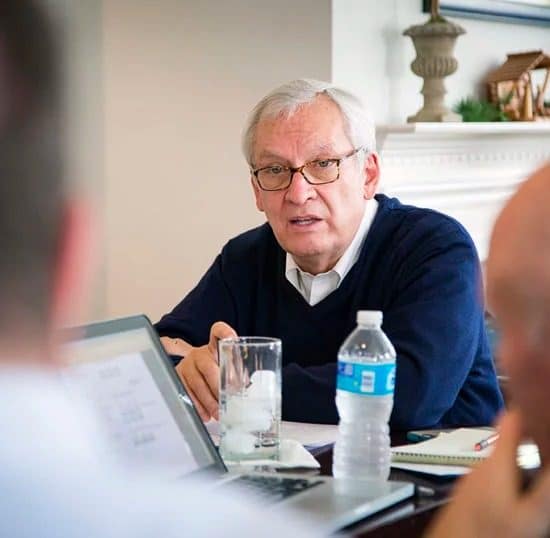
Look for materials on retirement in a typical bookstore, and you likely will find books with all kinds of advice on how best to save or invest to prepare for a comfortable retirement. These sources typically explain how much money the average person or couple might need to accumulate to meet the needs, wants and unanticipated expenses of retirement. A few advise how best to maximize Social Security benefits.
But a bookstore or Internet search might also uncover material designed to do more than cover the financial side of retirement. These authors seek to help retirees experience a satisfying retirement that incorporates a person or couple’s interests, passions and sense of purpose for their lives.

Linda and Jerry Cain are examples of planning for retirement. (Photo courtesy of the Cains)
|
In a piece titled “The Perfect Brew for a Fulfilling Retirement,” blogger Dave Bernard says a lot of preparation goes into brewing a perfect cup of coffee. “That same strategy of preparing and planning using the right equipment and ingredients can apply to living a fulfilling retirement,” he blogged.
Other experts agree that initiating the “second act” of life — the retirement years — should be carefully anticipated and thoroughly planned. More than one has noted that some people spend more time planning a vacation trip than they do the journey of retirement.
Jerry and Linda Cain became retirees when he concluded his service as president of Judson University in Elgin, Ill., in July 2012 after 14 years. During the previous 20 years, Jerry was chaplain and a vice president of William Jewell College in Liberty, Mo.
After retiring, he agreed to serve as Judson’s chancellor “and help the new president meet the donors and alums and people he needed to know to succeed. I said yes for two years with no salary but with expenses reimbursed. They have not cancelled the contract, and we are now in our third year.
“We began financing retirement when I started as Baptist Student Union director at New Mexico Highlands University…,” he said in an email interview. “They explained the retirement program and we intentionally opted to invest at the highest level that would be matched by the employer. That continued at Wayland Baptist University, William Jewell College and Judson University.”
Where to retire is one of the first considerations for many retirees, and it was important for the Cains.
“We started thinking about location and activities when we turned 60 and noticed our friends were retiring,” Cain said.
“My mother in Texas is 93, but she lives close to my older brother so we felt no compunction to move close to her,” Cain reasoned. “Linda’s parents are both deceased. Our son in California has no children, and the son in Kansas has two daughters, thus we chose to come to the Kansas City area.
“If you move close to the grandchildren and they see you regularly, you can get lost in the background,” he said. “If you live in Florida and they come to see you only once per year, you are the center of attention. Teenaged grandchildren are much more interested in their peers than their grandparents. Don’t base it all on the grandchildren.”
The couple make their home in Kearney, north of Liberty, and are grateful to continue living where they can enjoy all four seasons.
They opted to live simply, a long-term conviction. Linda describes their retirement as a change of emphasis.
They sold the four-bedroom home that they purchased in Elgin “to entertain as expected of a university president,” and purchased a two-bedroom, 1,506-square-foot retirement home with no stairs, no basement and wide doors. “We can live there until we die,” he said.
The couple made other retirement commitments.
Starting early in contributing to a retirement plan has guaranteed an adequate income that enables the couple to be generous to their church and various causes they believe are important.
Prior to retirement, “I used to have a job which paid the bills, but on the side I did the weekend missions and preaching as an enjoyable hobby,” Jerry explained. “Now the burden of making a living has been lifted and I do not have a job, but I still have the income. I get to emphasize my hobby and can afford to select what I say yes to.
“I planned $5,000 annually for travel in my retirement so that I could do missions, consulting, advising stuff at no expense to the client,” he said. “I can help schools in India and Burma and pay my way annually to use my expertise in exciting venues.
“I guess we could take that $5,000 and do a Viking River Cruise, but at this time, it is missions money,” he said.
He has done regular pulpit supply, and on March 1 began an interim pastorate at an ethnically diverse church of Anglos and Burmese — Grace Baptist in Kansas City.
Remuneration for his interim goes to Judson University to endow the Adoniram Judson Heritage Center, named after the pioneer missionary to Burma. Judson’s life and contributions are of significant interest to him. He has done and continues to do significant research on the missionary.
Jerry writes a regular column for a local newspaper and this spring is “collecting the 60-plus people and places named for Adoniram Judson and am writing a half page on each of them,” he said.
“I am writing the stuff I never had a chance to do previously.”
Consultants urge retirees to do their best to live a healthy and active lifestyle in order to enhance their retirement years and improve their longevity as they age. That advice has not been lost on the Cains.
They maintain a small yard, do yoga and walk three times a week and use a bicycle daily for errands. They volunteer in their church and in the community. Every Thursday, for instance, he volunteers at the Kearney food pantry. At 69, both of them are in good health.
Not everyone will transition into retirement on their own terms like the Cains.
Johnnie Godwin, former LifeWay Christian Resources vice president of general trade publishing, recounted in his book, “How to Retire Without Retreating,” that he learned he was losing his position to downsizing at age 55 when he was called to a no-preparation-required end-of-day meeting. He had worked for the publishing corporation for 22 years.
His wife was just as shocked as he when Godwin went home that evening and told her the news after dinner. They quickly agreed to do their own sabbatical for the remainder of the year and think through what they would do for the long term. Their plans included travel using severance funds he was granted at termination.
As it turned out, what they did was to begin their first year of retirement.
He would later say that the loss of his job turned out to be a blessing in disguise as he and his wife, Phyllis, launched a fulfilling retirement together and discovered an enjoyable “second act” in their lives.


